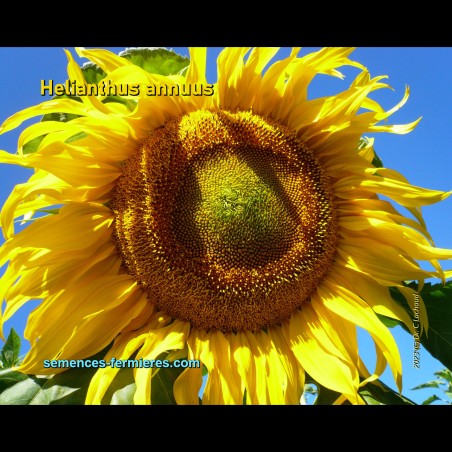














Helianthus annuus var. Mongolian Giant - Giant Sunflower
1 packet of 20 seeds
-
The Sunflower is cultivated on an industrial scale for its seed, a source of an edible oil rich in linoleic acid and low in cholesterol
This oil is used in the composition of cooking oils, margarines, etc., as well as in the composition of soaps, candles, paints, varnishes, etc.
Sunflower seeds are eaten sprouted, grilled and salted (snack), or mixed with breakfast cereals and bread flours
Other parts of Helianthus annuus also find some secondary industrial uses (paper from the bark of the seed and the stem of the plant; fuel from the stem; yellow dye from the flower)
The leaves and the flower can be used as an infusion, the sunflower having medicinal properties: Anti-psoriasis, Anti-rheumatic, Diuretic, Expectorant, Febrifuge, and Stomachic
Flowering lasts several weeks and is an abundant source of pollen for bees and bumblebees - they love it!
There is a great diversity of Sunflower varieties: Dwarf or giant, ornamental or for agriculture, with single, double, or full flowers, and of very variable color, ranging from whitish to bright yellow, deep orange, profound pinkish red, and even almost black
The variety "Mongolian Giant" (an agricultural selection from the Sovietic era) is among the most gigantic varieties
The adult plant can reach 4 meters high, with leaves more than 60cm wide
Its single, bright yellow flower, as magnificent as a sun, single at the top of an extremely robust stem, is enormous, with a heart often reaching 50cm in diameter
The seed is also among the largest produced by sunflowers
Unlike many giant sunflowers that break or shed, Mongolian Giant knows how to stand proudly without any help
Use the Mongolian Giant Sunflower both as a spectacular ornamental (abnormal dimensions, remarkable gigantic flower) and for seeds production (eaten roasted and salted as an aperitif)
Please Note!
Sunflower roots secrete growth inhibitors that have a negative and lasting impact on surrounding plants
Whichever variety of Sunflower you grow, install them a couple of meters away from cultivated areas
-
| Jan | Feb | Mar | Apr | May | Jun | Jul | Aug | Sep | Oct | Nov | Dec | ||
|---|---|---|---|---|---|---|---|---|---|---|---|---|---|
Sow Helianthus annuus in place at the end of May in warmed soil in a sunny position and sheltered from strong winds
Absolutely protect the seedlings from birds, rodents, and slugs, which all love it - although not the same way you do
To avoid the trouble, you'd better sow in the nursery at the beginning of May, in pots, and quickly transplant into the ground by burying the stem up to the cotyledons (this results in a better rooting and stronger plants)
When the plants reach 15 to 20 cm tall, they should be safe
Growth is then extremely fast, especially if your soil is fertile, temperature is hot, and rain falls
Flowering in July-August, harvest flowers for dyeing when in bloom, harvest seeds in September
You might also like
Payment :
PayPal < 150 €
Check < 850 €
Bank Wire > 149 €
Thank you for your kind understanding